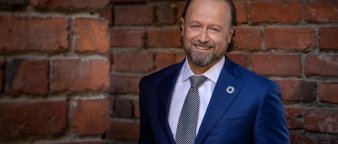As the Nordic leader for institutional clients and distribution, you are responsible for a multi-boutique covering several asset classes. What does a typical workday look like for you?
The first thing that strikes me is that my days are very varied, with many meetings with various parts of the organization. This ranges from meetings with the leadership team of Storebrand Asset Management, departmental meetings, projects, digital check-ins, and client meetings. I still manage some major clients, which also requires considerable time for preparation and follow-up. There are many ad-hoc discussions throughout the day about client cases, products, events, etc. It can be challenging to find time for high concentration tasks, but I really enjoy the action and variation during the workday!
You have employees and teams across the Nordic region. How do you build a working culture and community across countries?
The most important thing is to create good interpersonal relationships with mutual trust and respect. This requires getting to know each other well and having frequent interactions, both physically and digitally. I try to gather the entire Nordic team physically at least twice a year for professional and social interaction. In addition, I encourage everyone to spend time at each other's locations - whether it's in Oslo, Stockholm, Copenhagen, or Helsinki. I also try to visit our various offices regularly, often in connection with client events, but just as often without an agenda to spend time with colleagues and to better understand them and the business.
How long have you been with Storebrand, and what initially got you interested in finance and asset management?
I have been with Storebrand for just over 7 years, joining quite late in my career. Before this, I was with other major players like DNB, Nordea, Handelsbanken, and JP Morgan. In many ways, I feel like I have come "home". Storebrand has a culture and values that align well with what is important to me. My entry into finance and asset management was partly coincidental, but also a natural choice after studying business and finance in Norway and the US. Plus, it is an industry that is constantly evolving, where you learn new things every day, which appeals to me.
What do you find most rewarding about your job?
The most rewarding aspect is being part of an organization with great people, seeing them grow and develop, and experiencing collective joy in our successes. We also have an important mission in shifting as much capital as possible towards sustainable investments. If we succeed in sales, we succeed in our mission, and that adds extra meaning and motivation. Finally, it is incredibly rewarding when we create great customer experiences and receive positive feedback from our clients. After all, they are the ones we are here for!
You have worked with institutional clients for many years, and during this period, the dimensions of sustainability, regulations, and products have been constantly evolving. What is important for institutional clients today – what are they asking for?
Fundamentally, it is about delivering stable and competitive risk-adjusted returns over time. Our clients have increasing demands for sustainability in products and more detailed reporting. This is driven both by the clients' own preferences and regulatory requirements (EU taxonomy, SFDR, etc.) While there was previously more focus on which companies we exclude (exclusions), it is now increasingly important what we include and how we engage in active ownership. Clients and distributors are seeking advice on how to adapt to an increasingly complex and comprehensive regulatory framework. We also see growing demand for alternative investment products like real estate, private equity, and infrastructure.
In turbulent times, it is important for investors to build robust portfolios through the broadest possible diversification, and that they have access to alternatives that provide stable income and inflation protection. And I would also like to emphasize that high competence, good customer service, availability, and flexibility are crucial factors for success in working with institutional clients!
How do the needs of clients differ across the Nordic countries? Are there different demands for sustainable investments?
We work hard to be seen as a local partner for our clients in the Nordic countries. With skilled teams on the ground in Stockholm, Helsinki, Copenhagen, and Oslo, we have local knowledge and an increasingly strong network. Client needs are relatively similar, but there are important nuances. Swedish investors have typically been at the forefront in terms of demands for sustainable investments, and we see that alternative investments are higher on the agenda, for example, in Finland.
I believe having local anchoring and expertise in the individual markets is a huge advantage. It turns out that knowledge and experiences are transferable across markets. We are aiming to build a truly Nordic distribution business with close collaboration and interaction on a daily basis, and we hope our clients feel that we're succeeding in this!
Storebrand Asset Management has received excellent feedback in Prospera's client surveys. What do you think is behind these results?
Yes, we are immensely proud of the feedback we get from clients and distributors through the Prospera surveys in the Nordics. Being ranked #1 by Swedish institutions is a significant milestone! This is a result of the delivery from everyone in Storebrand Asset Management.
Good customer experiences depend on the entire value chain delivery. We are quite good at adapting to clients' needs and providing relevant solutions at the right price. We are constantly improving on digital platforms and are skilled at communicating our commitment to sustainability. Our brand is strengthening throughout the Nordics!
As we approach the end of 2023, it is time to summarize. What have been the biggest challenges related to interest rate hikes, inflation, and geopolitical unrest?
2023 has been a dramatic year in many ways. But despite war, escalating geopolitical tension, inflation, and a historically rapid increase in interest rates, global and Nordic stock markets have fared surprisingly well. By the end of November, the global stock market is up 18 percent, and the Norwegian and Swedish markets are up close to 10 percent. After a weak year in 2022 where both stocks and bonds yielded negative returns, many investors have chosen to sit on the fence, being cautious about allocating new funds to risky assets like stocks, private equity, etc. Commercial real estate has been particularly hard hit by the interest rate hikes and uncertainty around correct valuation. Many large real estate players in Sweden and Norway have encountered financial troubles, and the transaction market has completely stalled.
On the positive side, you now get paid to invest in bond products after a lengthy period with low, and even negative, interest rates. Especially in turbulent times, it is important to stay close to clients, ensure our products are predictable, and act as a long-term partner that can be relied upon. In relative terms, we have done quite well with good net growth in new capital and many new clients in the Nordics.
In today's market situation, which products are more in demand now?
As I mentioned earlier, both money markets and bond funds have seen a "new spring" with completely different returns than what was the case just recently. With strong fixed income teams both in Sweden and Norway, we are in well positioned to capture this flow. We are also seeing increasing interest in infrastructure investments. For us to succeed in the green transition, massive investments in renewable energy, energy distribution, electrification of the transportation sector, etc., will be required. Investments in infrastructure provide long-term and predictable income and can contribute to good diversification in a portfolio for an institutional investor.
Within alternative investments, we have asset classes like infrastructure, real estate investments, and private equity. Have these become a more common part of institutional portfolios, and if so, why do you think that is?
Globally, we see a strong trend towards increased allocations to alternative investments. An ever-larger share of the world's value creation is now happening outside the listed market, and long-term investors are seeking this potential for extra returns and diversification. Nordic institutions have a lower allocation to alternatives than, for example, American and British institutions. The unlisted market, whether it is private equity or infrastructure, requires specialized expertise and has historically only been accessible to the largest investors. One of our strengths is that we can offer our clients to invest alongside our life insurance companies, thus providing access to high-quality alternatives at the right price.
What are you particularly looking forward to in 2024?
We have great ambitions for 2024 and the years ahead. Storebrand Asset Management offers a wide range of sustainable quality products that we believe are relevant for existing and new clients. Next year, we are launching Storebrand Infrastructure II, something we are looking forward to with excitement! This is a product that will only be available to professional investors. Otherwise, it will be important for me to take good care of my employees, strengthen collaboration, and continue building on our position in the Nordics.
You mentioned that 2023 has been a dramatic year. What are your hopes for 2024?
That is a big question! On a personal level, the most important thing is that my loved ones are doing well and living meaningful lives. Professionally, I hope we avoid a global recession that many predict after a historically prolonged period of growth. Even more broadly, I wish for an end to the war in Ukraine and the Middle East. And finally, that the global community takes the climate and nature crisis seriously and accelerates the transition to a sustainable future!







